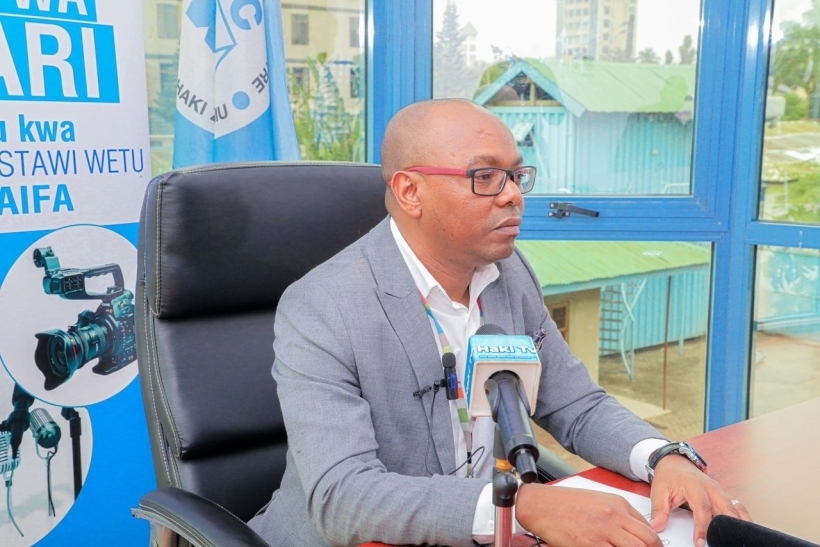
LHRC 2024/2025 Budget Analysis.
On June 26, 2024, the Legal and Human Rights Centre (LHRC) shared its proposals with the public following an analysis conducted after the government's budget proposals for the 2024–2025 fiscal year, which were presented by the Minister of Finance, Hon. Mwigulu Nchemba, on June 13, 2024, in the Parliament of the United Republic of Tanzania. Director of Advocacy and Reforms at LHRC, Advocate Fulgence Massawe, speaking to the press at the LHRC offices in Kijitonyama, said that this analysis was conducted from a human rights perspective, considering the rights enshrined in the Constitution of the United Republic of Tanzania, 1977.
Additionally, LHRC has considered gender needs, climate change challenges, and the current economic hardship. Overall, the budget proposes tax amendments in twenty-five (25) laws; however, LHRC has prioritized eight (8) laws that it has been working on and providing feedback on for a long time.
LHRC has identified the following areas of concern:
1. BUDGET COMPARISON AMONG EAST AFRICAN COUNTRIES Despite Tanzania being the largest country in East Africa by land area and population, our budget ranks third, behind Kenya and Uganda. It's worth noting that Tanzania still has major priorities and strategic projects requiring significant funds. • Example: 2024/2025 Main Budgets: Kenya TZS 77 trillion, Uganda TZS 50 trillion, Tanzania TZS 49.35 trillion, Rwanda TZS 11.27 trillion, and Burundi TZS 3.999 trillion. o Country Sizes (Sq. KM): Tanzania 945,087, Uganda 241,550, Kenya 225,000, Burundi 27,830, and Rwanda 26,338. o Population (2022): Tanzania 65.5 million, Kenya 54.03 million, Uganda 47.25 million, Burundi 13.89 million, and Rwanda 13.78 million.
2. EXPENDITURE DISTRIBUTION
Our budget is more focused on recurrent expenditures than development. Currently, 70% is allocated to recurrent expenses, with only 30% for development. This indicates that we cannot expect significant development or new development projects since our budget primarily covers recurrent expenses, salaries, and debt payments. Extravagant expenditures include luxurious vehicles and top officials living mostly in Dar es Salaam instead of Dodoma, leading to higher costs for maintaining two capitals. Additionally, the government should reconsider the size of its administration. Increasing the rank of Deputy Prime Minister adds costs to the government. There are now many ministries with deputy ministers and deputy secretaries, even in ministries that previously did not have such positions. Our budget often has a deficit, but this deficit does not affect recurrent expenses. When there is a deficit, development projects are impacted, not recurrent expenses. The government needs to address this and direct more revenue towards the country's development. LHRC believes that development is fundamental to human rights.
3. NEW REVENUE SOURCES
Revenue sources remain the same, with very few citizens contributing to the budget through taxes. Some revenue sources, like alcohol, are not sustainable because if Tanzanians change their lifestyles and stop drinking or smoking, the country will struggle to sustain itself. The government needs to explore new revenue sources. For example, local government contributions to our budget are minimal. Local governments have failed to create new revenue sources, such as by surveying land extensively and issuing land titles to collect land taxes. Despite Tanzania being the third-largest producer and exporter of gold and having exclusive access to tanzanite, minerals have not significantly contributed to our budget.
4. FOREIGN EXCHANGE USAGE
There has been a significant shortage of foreign currency in the country, and the government has failed to identify the cause. We have seen the government banning the use of foreign currency, which will only worsen the situation since foreign currency is still highly needed in our economy as we rely heavily on importing goods. The shortage is caused by the imbalance between our exports and imports. The government needs to develop a strategy to revive and promote the production of cash crops like coffee, cotton, sisal, and cashew nuts. The government must create a conducive environment and encourage large investors to invest in our country. Despite Tanzania having abundant resources, it has never been the top investment choice. The factors hindering investment in Tanzania are well known, but the government has failed to address them. Some countries in our region, smaller than Tanzania, have better policies for land acquisition and ownership, friendly immigration laws for investors, and can register a company and obtain all necessary permits within a day for investment purposes. Allowing the importation of sugar from abroad has significant negative impacts on the balance of trade and the misuse of foreign currency. The government should promote domestic production and investment in sugar production. Allowing sugar imports will create opportunities for individuals with ill intentions to sabotage local production to get import permits. Additionally, the cost of importing sugar is lower than that of domestic production, so many will prefer importing over producing. Besides foreign currency usage, this sugar issue has major implications for consumers, including production shortages, high prices, and safety concerns.
5. GOVERNMENT DEBT The government debt has continued to increase, as highlighted in the Economic Status Report, 2024, and the National Development Plan, 2024–2025, presented by the Minister of State, President's Office Planning and Investment, Hon. Kitila Mkumbo. The debt reached TZS 91.7 trillion in March 2024, compared to TZS 69.44 trillion in 2022, up from TZS 60.72 trillion in 2021. This suggests that the cost of living could rise due to debt repayment. We believe it is crucial for the government to reduce operational costs, including allowances, luxurious lifestyles, and expensive vehicles, which could be replaced with more cost-effective alternatives.
6. EFFORTS TO COMBAT CLIMATE CHANGE
The budget contradicts international efforts to protect the environment by imposing taxes on gas used for running engines such as cars and motorcycles and on electric vehicles. This proposal hinders the achievement of Sustainable Development Goal 13, which urges UN member states to implement policy plans to combat climate change. We know that gas and electric energy are among the least harmful to carbon emissions compared to petrol and diesel.
Download the budget analysis HERE
